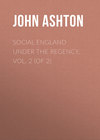Buch lesen: «English Caricature and Satire on Napoleon I. Volume I (of 2)», Seite 9
CHAPTER XXIII
THE PEACE OF AMIENS – CESSION OF TRINIDAD AND CEYLON – INTERNATIONAL VISITS – FOX’S TRIP TO FRANCE, AND RECEPTION BY NAPOLEON
An unknown artist, probably Ansell, produced on October 26, 1801, a caricature of ‘The Child and Champion of Jacobinism new Christened (vide Pitt’s Speech).’ Bonaparte is bending over a font, which, is supported by Egyptian sphinges, whilst a bishop calls out, ‘Name this Child.’ Addington and Pitt are the godfathers, and Lord Hawkesbury is the godmother. Pitt replies, ‘Deliverer of Europe and Pacificator of the World.’ Addington says, ‘I hope he will abolish the Slave Trade’; and the godmother mentions, ‘You need not say anything about the march to Paris.’
Gillray (November 9, 1801) gives us a very elaborate picture of ‘Political Dreamings – Visions of Peace! – Perspective Horrors!’ Windham, who was the leader of the war party, is asleep, and his dreams are full of incident – too full, indeed, to recapitulate here. But the principal scene in the sleeping man’s vision is Napoleon dragging to the guillotine by a halter, Britannia, whose trident is broken, as, also is her shield.
‘The Balance of Power,’ by Ansell (December 1, 1801), shows a pair of scales, in which Bonaparte weighs down Pitt and the Lord Chancellor. Pitt ruefully exclaims, ‘So this is the Balance of Power we have been making such a fuss about – a pretty piece of business we have made of it. Curse that sword of his, ’tis that has made us kick the Beam.’
Hostilities with France having ceased with the ratification of the preliminaries of peace, there was but little caricaturing of Napoleon, and none of an offensive character. Napoleon occupied his time in attending to home affairs, as also did the British Government. But the peace was not absolutely concluded, and much diplomatic wrangling took place, as usual, before the Peace of Amiens was really signed on March 27, 1802. Its principal articles must be briefly enumerated here, as they will be found of use in understanding forthcoming caricatures.
England restored to France, Spain, and Batavia, all the possessions which had been occupied or conquered during the war, with the exception of Trinidad and Ceylon. Malta was to be restored to the Order of St. John of Jerusalem – the British troops to evacuate the island within three months, or sooner; but Malta was to be independent, such independence being guaranteed by the Great Powers, and the ports to be open to the vessels of all nations, with the exception of those belonging to the Barbary Powers. These are the principal articles necessary for us to bear in mind.
Due credit was given to Bonaparte’s astuteness, and our plenipotentiary, Lord Cornwallis, was considered no match for him.
The Caricature year of 1802 seems to open with one by Ansell (January 9), ‘A Game at Chess’ between Bonaparte and Lord Cornwallis. Bonaparte says, ‘Check to your King. Remember this is not the first time, and I think a very few Manœuvres more will compleatly convince you that I am better acquainted with the Game I am playing, than you are aware of.’ Cornwallis, tearing his hair, exclaims, ‘Curse it, I shall lose this game. You are too much for me.’
This was followed by another from the same pencil (February 8), called ‘Cross examination,’ where Lord Cornwallis is button-holing Bonaparte, and saying, ‘There is great delay in our negociation comeing to a conclusion, and I understand our People are very uneasy lest you should be Humbugging us – Your fleet having sail’d, has given cause for many conjectures, and to tell you the truth it puzzles me a little to know what your intention is.’ Bonaparte’s reply is plain and simple, ‘I have to tell you, Sir, that I do not desire to give you the information you seem to wish for, and whether I sign or not, is of little consequence to the Republican government; our fleet I am in hopes will pick up something.’
In March 1802 Woodward produced a somewhat dreary picture called ‘The National Institute’s first Interview with their President.’ Napoleon, seated under a canopy, says to Sheridan, Fox, Bedford, and Burdett, ‘Gentlemen, you are welcome, and I invite you to the Honors of the sitting.’ Sheridan, who is kneeling, holds a phial and box in his hands, and begs that Napoleon will ‘Be pleased to accept some true poetic Tincture, and a small Box of Pizarro64 Pills.’ Fox, who has a money bag under his arm, says, ‘I have brought a pound and a half of Patriotism for your eminence.’ The Duke of Bedford opines that ‘He’ll not be displeased with a few Bedford biscuits;’ and Burdett, with his hair, as usual, combed over his eyes, refers to his present, ‘I have brought him a Phial of Genuine Bastile Balsam.’
But when once the peace was signed, much show was made of shaking hands and being friends. Englishmen went over to France in numbers; Frenchmen reciprocated, but not to the same extent. This feeling is shown by the caricaturist, for on April 14, 1802, was published (artist unknown) a picture entitled ‘A Peaceable Pipe, or a Consular Visit to John Bull.’ Napoleon and John Bull are in amicable converse, smoking, and drinking beer. John Bull says, ‘Here’s to you, Master Boney Party; come, take another whiff, my hearty!’ To this hospitable invitation Napoleon replies, ‘Je vous remercie, John Bull, I think I’ll take another pull.’ Mrs. Bull is hard at work mending John’s breeches, which are wofully dilapidated: says she, soliloquising, ‘Now we are at Peace, if my Husband does take a drop extraordinary I don’t much mind, but when he was at war, he was always grumbling. Bless me, how tiresome these old breeches are to mend; no wonder he wore them out, for he had always his hands in his pockets for something or other.’
As before said, with the peace came mutual intercourse between England and France, and there is a picture by Ansell (May 14, 1802), which represents ‘A Trip to Paris, or Iohn Bull and his Spouse, invited to the Honors of the Sitting!!’ Napoleon receives John Bull and Ireland, and when seated, Napoleon addresses them thus: ‘Indeed, Mr. Bull, I am quite charmed with you – there is something so easy and polite in your manners.’
John Bull, however, is not to be taken in by such palpable ‘blarney,’ and replies, ‘Come – come Mounseer Bonny party, that’s all gammon d’ye see. D – n me if I know more about politeness than a Cow does of a new shilling!!’ Ireland looks very angrily at her spouse, and remonstrates: ‘For shame, Mr. Bull, what will the Jontleman think of your Blarney about gammon and cows, and Bodder and nonsense; by St. Patrick, I must send you to Kilkenny to larn good breeding.’
Some of these caricatures were rather dreary; take, for example, ‘The Consular Warehouse or a Great Man nail’d to the Counter’ (Cawse, May 20). Napoleon is keeping a shop, selling, among other things, ‘Preserved Promises, Pickled Piety from Rome, Oil of Lodi, Marengo Olio, Bullet Bolusses advice gratis. N.B. One Pill is a dose, also Islands for Home Consumption Martinique – St. Lucia.’ John Bull has just bought two, paid for in good hard cash, and takes his goods home with him. Under one arm he carries the ‘Island of Indemnity, ci-devant Ceylon’ – under the other is the ‘Island of Security, ci-devant Trinidad.’ They hardly seem to be John Bull’s idea of a bargain, for he is saying, ‘They be very light to be sure – but harkee, my worthy, – you’ll not forget to carry on a little trade with the Old Shop; if you don’t, you know, a Rowland for an Oliver, that’s all.’ Napoleon, however, reassures him with ‘We’ll not talk of that at present, Mr. Bull; all you have to do, is to take care of your new Islands; mind you don’t tumble down, and break them, before you get home – They are very brittle, but a very good article for all that.’
As the year grew older, the entente cordiale grew colder. Suspicions of Napoleon’s intentions were aroused, and Malta was not evacuated as per treaty. One or two warning caricatures, stormy petrels, made their appearance, and in the autumn of this year appeared ‘The Corsican Conjurer raising the plagues of Europe.’ He is shewn with huge cocked hat and an ample robe, which is held up by the Devil, who encourages him, ‘That’s right my fine fellow – If you don’t kick up a pretty dust in the world, never trust the Devil again – that’s all.’ Napoleon is waving a rod over a caldron, in which are serpents, and a devil, the steam from which is labelled, in different clouds, ‘Anarchy, Pride, Murder, Confusion, Treason, War, Plunder, Revenge, Massacre, Avarice, Cruelty, Usurpation, Hatred, Horror, Envy, Blasphemy, Malice, Craft, Falsehood, and Terror.’
There is another one, ‘Parcelling out John Bull,’ which is a queer conceit. Napoleon has a huge pair of Compasses, with which he is measuring John Bull – congratulating himself that ‘He really will make a pretty addition to my departments – he cuts out extremely well indeed.’ There is the Wig Department, Department of the Head, Arm Department, Department of the Body, Fob Department, Breeches pocket Department, Right and Left Leg Divisions. But John Bull assures his friend, in no kindly spirit, ‘Harkee Young one, you have forgotten the Fist Department, and if you don’t take away your d – d Compasses, I’ll give you a relish of it. Cut me out, indeed! why, I’ll fight you with one hand tied behind me.’ This caricature is neither signed nor dated, but it was undoubtedly issued in the autumn of 1802.
We have seen that it was fashionable for Englishmen to run over to France after the conclusion of peace, and Charles James Fox was no exception to the rule; but he had to wait a little, until after the Westminster election, when, on July 15, he was returned head of the poll. He did not long delay the trip, and on July 29 he set out on his journey, accompanied by his wife, the Hon. St. Andrew St. John (afterwards Lord St. John) and a young Irishman named Trotter,65 who wrote an exhaustive account of their journey. On the 4th of August, Napoleon had been elected Consul for life, a step which might probably tend to consolidate peace, and which rendered his position equal to any other European sovereign. When Fox reached Paris, it was rumoured that this was only preliminary to his taking a higher rank, with the title of Emperor of the Gauls. Just then, Englishmen were in great favour at Paris, and Fox’s arrival created a great commotion. All vied with each other to pay him attention, and it was settled he should be presented to the First Consul at his next levée, which took place on September 3.
Caricaturists, like poets, must needs be allowed some licence, and Gillray (November 15), in his picture of the ‘Introduction of Citizen Volpone,66 and his Suite, at Paris,’ draws slightly upon his imagination as to Napoleon’s state at this reception; still the allegorical globes, and the introduction of Rûstan the Mameluke, add a fictitious dignity to the picture.
The actual scene, as it was viewed by an eye-witness,67 is thus described: ‘We reached the interior apartment, where Buonaparte, First Consul, surrounded by his generals, ministers, senators, and officers, stood between the second and third Consuls, Le Brun and Cambacérès, in the centre of a semicircle, at the head of the room! The numerous assemblage from the Salle des Ambassadeurs, formed into another semicircle, joined themselves to that, at the head of which stood the First Consul.’
Gillray’s portrait of Charles James Fox is not very much exaggerated. Let us hope that of Mrs. Fox is. This lady, although she was married to Fox on September 28, 1795, was never introduced to his friends as his wife until this journey. She was always believed to be his mistress, Mrs. Armistead.68 She made him a good and loving wife, and he was very fond of her.
Trotter describes the actual presentation thus: ‘Buonaparte, of a small, and by no means commanding figure, dressed plainly, though richly, in the embroidered consular coat, without powder in his hair, looked like a private gentleman, indifferent as to dress, and devoid of all haughtiness in his air… The moment the circle was formed, Buonaparte began with the Spanish Ambassador, then went to the American, with whom he spoke some time, and so on, performing his part with ease, and very agreeably; until he came to the English Ambassador, who, after the presentation of some English Noblemen, announced to him Mr. Fox! He was a good deal flurried, and after indicating considerable emotion, very rapidly said, “Ah! Mr. Fox! I have heard with pleasure of your arrival – I have desired much to see you – I have long admired in you the orator, and friend of his country, who in constantly raising his voice for peace, consulted that country’s best interests – those of Europe – and of the human race. The two great nations of Europe require peace; – they have nothing to fear; they ought to understand and value one another. In you, Mr. Fox, I see, with much satisfaction, that great statesman who recommended Peace, because there was no just object of war; who saw Europe desolated to no purpose, and who struggled for its relief.”
‘Mr. Fox said little, or rather, nothing, in reply, – to a complimentary address to himself, he always found invincible repugnance to answer; nor did he bestow one word of admiration or applause upon the extraordinary and elevated character who addressed him. A few questions and answers relative to Mr. Fox’s tour terminated the interview.’
Other caricaturists took the matter up, for Fox’s visit to Paris was naturally commented on; and there is an engraving by Ansell (November 8, 1802), ‘English Patriots bowing at the Shrine of Despotism.’ These ‘Patriots’ are Fox, Erskine, and Combe, the brewer, who was Lord Mayor. They are represented as bowing in the most lowly fashion – so low, indeed, that Fox has burst his trousers behind; and with one voice they assure Napoleon that they ‘are, with the highest consideration, your Super Royal Consulship’s most Devoted, most Obsequious, and most honored Servants.’ Bonaparte, seated in almost regal state, criticises them: ‘Oh, from the World! O’Connor’s friends – Fox, ha! how old are you? A Brewer; Lord Mayor, ha! great pomp. Mr. Brief, ha! a great Lawyer can talk well. There, you may go.’
Thus we see they did not quite get hold of the right version of this interview, as ‘Taking leave’ was satirised by a nameless artist (November 12, 1802), and represents Fox bowing very humbly to the First Consul, who is crowned with death’s-head and cross-bones, daggers, pistols, and swords, and regards him in an extremely haughty manner.
CHAPTER XXIV
LORD WHITWORTH AS PLENIPOTENTIARY – HIS EQUIPAGE – ENGLISH VISIT PARIS – UNSETTLED FEELING – NAPOLEON BEHAVES RUDELY TO LORD WHITWORTH
In June, Lord Whitworth was appointed ambassador extraordinary, and minister plenipotentiary, to the French Republic, and the state he then kept up was a striking contrast to the plainness of Republican equipages. It was different under the Empire; but then the word Citizen had not been dropped, and there was a certain affectation of simplicity. The English attracted great attention by the splendour of their equipages, and there is a caricature (nameless, December 14, 1802) of ‘Lord Whitworth’s Coachman at Paris.’ His get-up is, certainly, ‘exceeding magnifical,’ and is the wonder of the Parisians. It is almost too much for his equanimity, for he is shown as saying, ‘How the Mounseers stare at me! D – n me, if I don’t think they take me for the Ambassador.’
The effects of the peace were hardly realisable for a time, and Woodward gives us an amusing caricature of the state of the empire (December 20, 1802). It is called ‘A Peep at the Lion,’ which is supposed to be on show. Outside the Exhibition Pitt is inviting Europe, generally, to ‘Walk in Ladies and Gentlemen, and see the famous Lion. Though I have some share in the concern, I have nothing to do with showing him, I assure you – I am not his keeper; the Lion I used to show was very fierce, but this is quite quiet and peaceable.’ Inside, the Lion is shewn as lying down, but with one eye open, Napoleon patting him on the head, saying, ‘Poor fellow, poor fellow, what a beautiful Animal, – how sound he sleeps.’ But the Chancellor, Lord Eldon, warns him, ‘You had better not be too free with him Sir, In case of an accident. He is now asleep with one eye, and awake with the other.’
At the opening of the year 1803, although the storm clouds of war were ominously gathering, yet all seemed peace. The English enjoyed the rare treat of visiting France, and, generally, being of the better class, were well received. The year opens in a kindly spirit with ‘The first kiss these ten Years! or the meeting of Britannia and Citizen François’ (Gillray, January 1, 1803), which is a remarkably good caricature. Britannia, owing to the peace, has grown prosperous, and stout; her trident and shield are put away in a corner, and the portraits of Napoleon and George the Third repose, in loving juxtaposition, on the wall, intertwined with palm-branches. Says Citizen François (his sword and cocked hat being laid aside), ‘Madame, permettez me to pay my profound esteem to your engaging person! and to seal on your divine Lips my everlasting attachment.’ Madame Britannia replies, ‘Monsieur, you are so truly a well bred Gentleman! and tho’ you make me blush, yet you kiss so delicately, that I cannot refuse you; tho’ I was sure you would deceive me again!!!’
A most amusing picture (Gillray, January 1, 1803) is that called ‘German Nonchalance, or the vexation of Little Boney. vide the Diplomatique’s late Journey through Paris.’ It represents the Austrian ambassador being driven furiously through Paris, his luggage being directed ‘à Londres.’
With the utmost insouciance, he is taking a pinch of snuff, calmly regarding Napoleon, who is standing on some steps, and is in a fearful rage. With arms and legs outstretched, and his hat fallen off, he yells out, ‘Ha, diable! va t’en, Impertinent! va t’en! is dere von Man oh Earth who not worship little Boney? Soldats! aux Armes! revenge! ah! Sacre Dieu, je suis tout tremblant.’ The soldiers, however, although preparing to draw their swords, do not appear to be particularly anxious to avenge their insulted leader.
This incident arose from the Austrian minister neglecting to pay his respects to the First Consul, whilst passing through Paris.
As an evidence of the uneasiness of public political feeling, take the following. In January 1803 was published a caricature by Raymond, called ‘Leap Frog.’ Napoleon has already jumped over the bowed backs of Holland and Spain. The poor Dutchman exclaims, ‘He has left the Swiss and Italians a Mile behind – and as for me he has knocked my hat off and broken my pipe – pretty encouragement this to play at Leap-frog.’ The don ruefully says that ‘By St. Jago – my back is almost broken.’ Napoleon is now jumping over Hanover, who plaintively asks, ‘Why did I submit to this?’ but the conqueror only says, ‘Keep down your head Master Hanoverian, my next leap shall be over John Bull.’ But that individual, who looks uncommonly belligerent, with clenched fists, exclaims, ‘I’ll be d – d if you do Master Corsican.’
The English Government, seeing how Napoleon was aggrandising himself, and seeing also that this country, alone, could save the liberty of Europe, did not hurry to conform with the treaty of Amiens, and surrender all the advantages gained by the late long struggle; and although, with reluctance, the Cape, and other Batavian settlements, were given up, excuses were always to be found for not evacuating Malta.
On January 25, Lord Whitworth and Talleyrand had an interview, and the latter, after bitterly complaining of the licence of the British press, which he said ought to be curbed, or suppressed, asked plainly what were the intentions of the British Government with regard to Malta? It is to this interview, probably, that the following caricature owed its existence. How Cobbett lashed Addington, for his nepotism, in his ‘Annual Register’!!
‘The Evacuation of Malta’ (Gillray, February 9, 1803) is vividly, almost too graphically, depicted. Ferocious little Bonaparte has hold of poor frightened Addington by his necktie, and, by flourishing his enormous sword, compels him to evacuate Malta, Egypt, Cape of Good Hope, St. Domingo, Guadaloup, and Martinique. In vain Addington pleads, ‘Pray do not insist upon Malta! I shall certainly be turned out! and I have a great many Cousins and Uncles and Aunts to provide for yet.’ But his merciless enemy will hear of no compromise, and yells out ‘All! All! you Jean F – t – e! and think yourself well off that I leave you Great Britain!!!’ A French officer mildly remonstrates, and suggests, ‘My General, you had better not get him turned out, for we shall not be able to humbug them any more.’
Ansell executed an engraving (February 10, 1803) of the ‘Rival Gardeners,’ which represents Napoleon, and George III., tending their respective gardens, which are divided by the Channel. Napoleon has a number of plants labelled ‘Military poppies,’ which flourish well; but he is greatly concerned about his principal flower, which has a very drooping head and flagging leaves. He cannot understand it. ‘Why, I don’t know what is the reason; my Poppies flourish charmingly; but this Corona Imperialis is rather a delicate kind of a plant, and requires great judgment in rearing.’ His rival, however, points with pride to the sturdy British Oak, whose vigour is matchless, and is in full bloom, with a royal crown. He replies, ‘No, No, Brother Gardener, though only a ditch parts our grounds, yet this is the spot for true Gardening; here the Corona Britanica and ye Heart of Oak will flourish to the end of the world.’
On March 8, the king sent a message to Parliament, respecting military preparations in the ports of France and Holland, and acquaints the House of Commons that ‘he has judged it expedient to adopt additional measures of precaution for the security of his dominions;’ and this gives us the key to the next caricature —
‘Physical Aid, or, Britannia recover’d from a Trance, also the Patriotic Courage of Merry Andrew, and a peep thro’ the Fog,’ was published by Gillray, March 14, 1803, and is a very amusing picture. Bonaparte, and his flotilla, are crossing the Channel, and Sheridan, with fool’s cap and bell, a tattered harlequin suit, a lathen sword, ‘Dramatic Loyalty,’ a shield with a Medusa’s head, the snaky hair of which is labelled ‘Envy, abuse, bouncing, puffing, detraction, stolen jests, malevolence, and stale wit,’ and a paper, in his sash, endorsed ‘Ways and means to get a living,’ calls out, ‘Let ’em come! dam’me!!! Where are the French Buggabos? single-handed I’d beat forty of ’em!!! dam’me I’d pay ’em like Renter’s shares, sconce off their half-crowns!!! mulct them out of their benefits, and come ye Drury Lane Slang over ’em.’
Britannia, suddenly aroused from her trance, screams out, ‘Doctors and ministers of disgrace defend me,’ and attempts to rise. Addington is attempting to recover her, by holding a bottle of gunpowder to her nose, saying ‘Do not be alarm’d, my dear Lady! The Buggabos (the Honest Gentlemen, I mean) are avowedly directed to Colonial service, they can have nothing to do Here, my lady – nothing to do with US! do take a sniff or two to raise your Spirits, and try to stand, if it is only upon one leg.’ Lord Hawkesbury is presenting, in a feeble manner, to Britannia, her spear – with broken point, and her shield, which is sadly cracked, and bleats forth, ‘Yes, my lady, you must try to stand up, or we shall never be able to march to Paris.’ Fox, who is wilfully screening his face with his hat, exclaims, ‘Dear me – what can be the reason of the old lady being awaked in such a fright? I declare I can’t see anything of the Buggabos!’ On the ground lies the treaty of peace torn.
On March 13, Napoleon behaved in a very rude, and intemperate, manner to Lord Whitworth respecting the non-evacuation of Malta – which scene is thus versified: —
Our hero now, with great chagrin,
Begg’d of Lord Whitworth to call in.
Agreeably to his request,
Th’ Ambassador became his guest,
And in the Cab’net of the Thuilleries,
Napoleon play’d off all his fooleries.
‘What is the cause,’ he cried, ‘of this?
How comes it England acts amiss?
I swear that every provocation,
Daily augments my indignation;
Why are these libels to annoy me,
Pensioned assassins to destroy me?
Why Malta’s non-evacuation,
And Alexandria, by your nation?
You’d fain keep Malta – I believe you,
But part of France I’d rather give you.
Why all these provocations? why o’ late,
The Amiens treaty dare to violate?’
Nap ask’d so many questions now,
That not an answer he’d allow.
Lord Whitworth moved his lips, but then
Our hero wagged his tongue again.
It seems Lord Whitworth wish’d to say,
France for infringements led the way;
But when that she was pleased to stop,
And all her base aggressions drop,
The treaty England would fulfil,
For that, indeed, was England’s will.
In spite of Nap’s vociferation,
His Lordship made this observation:
‘My sovereign’s actions ne’er have been
Insidious, treacherous, or mean,
Because it is the king’s desire
More to preserve than to acquire.’




















